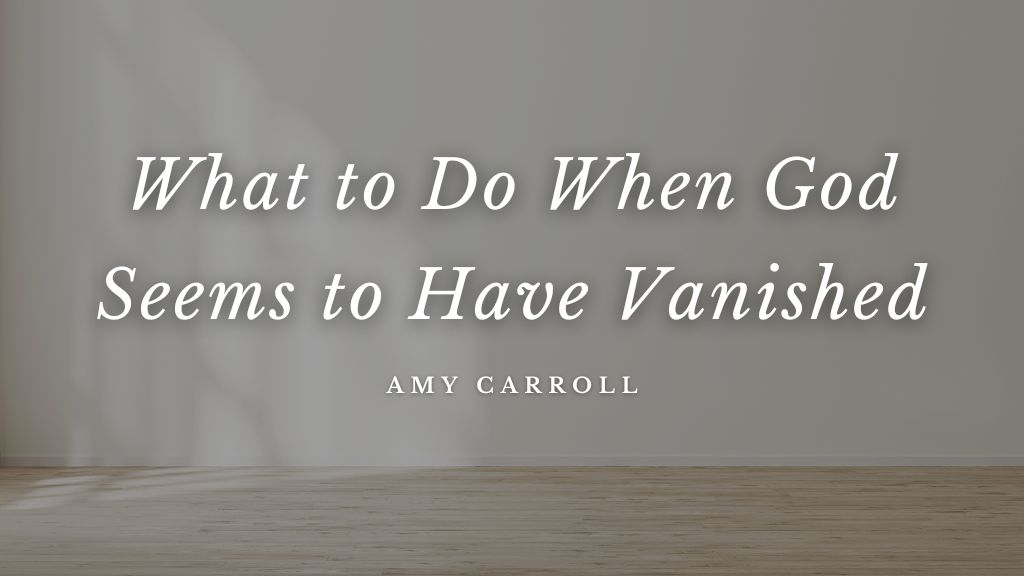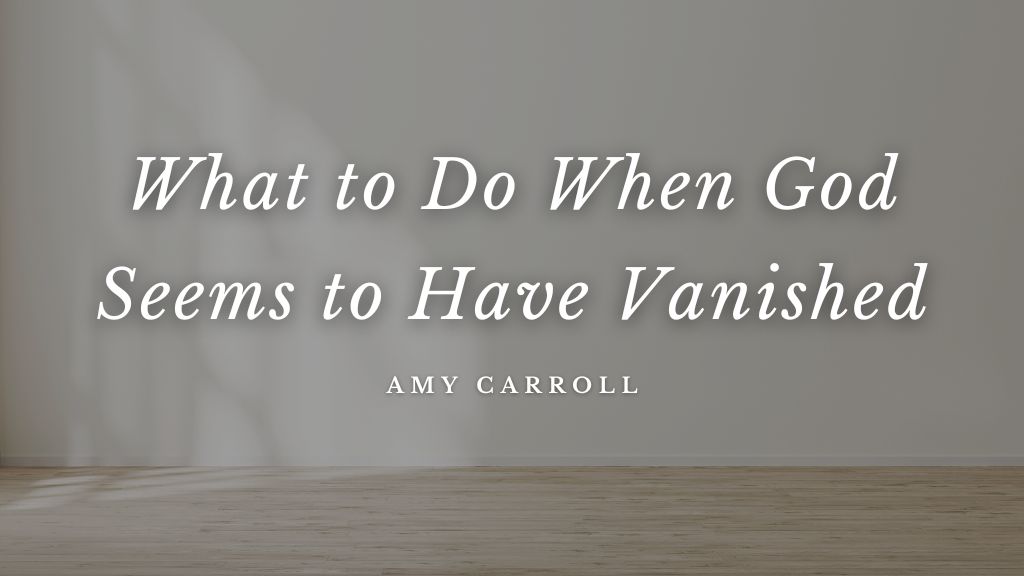

“I need to practice trusting You during quiet days, when nothing much seems to be happening. Then, when storms come, my faith-balance will be sufficient to get me through those tough times. Please remind me to affirm my trust in You.”
– Jesus Listens, February 22nd
“Lord, where are you?”
Cloud of hurt
A sudden and sharp conflict with a friend left me reeling. The remaining cloud of hurt left me feeling as though God was gone. Despite walking with Jesus for decades, I couldn’t feel Him.
I needed His presence. I craved His voice. Yet I felt deaf to the once-familiar whispers of His Spirit. The well-worn pages of my Bible and my battered faith told me He was still there, but it seemed God had disappeared into the blind spot of my pain.
How do we see our invisible God when it seems He’s vanished? When He’s silent on a looming decision? When our stability is shaken? When our “surefire” spiritual formula isn’t working? What do we do when He seems to have disappeared from a situation that’s spinning out of control?
Conflict with friends
You may not have experienced a conflict with a friend like me. But because we live in a broken world where the fallout of sin affects us all, it’s only a matter of time until each of us suffers in some way. The pain of suffering multiplies when we can’t sense God. And yet, as we continue to seek Him,the power of God can often be the most powerful in these times.
The book of Esther is one of only two books of the Bible where God isn’t named. Not once. There are no prophetic words from Him, angelic visitations, or supernatural miracles. However, this book can be a beautiful place to find solutions when God is silent. Esther shows us how godly people can still act faithfully when they can’t hear or see Him.
In chapter four, the turning point of the story, Esther’s cousin Mordecai tells her to risk her life by going unbidden to her husband, the king, to save her people. Esther replies:
“Go, gather together all the Jews who are in Susa, and fast for me. Do not eat or drink for three days, night or day. I and my attendants will fast as you do. When this is done, I will go to the king, even though it is against the law. And if I perish, I perish.” (Esther 4:16 NIV)
In her succinct response, we can glean three proactive steps to take when God seems to have vanished.
Esther mobilized the courage of the community
When God calls us into hard places like suffering or risky actions, He almost always provides community for resources and support. He provided Aaron and Hur to hold up Moses’ arms during a battle (Exodos 17:12). God sent Mary to receive support from Elizabeth after the angel said she was carrying the Messiah (Luke 1:39-45). He arranged for Paul to meet Lydia who hosted his Philippian church plant (Acts 16:11-16). When you start to read your Bible with a community lens, you’ll see His helpers over and over again!
Esther wisely rallied her community, both serving them and leaning on them. She was a woman who recognized the courage we can gain from community, and reached out with confidence to gather them. Consider your friends and family. Who has God given that could lend you courage in your uncertain circumstances?
Esther harnessed the fortitude of fasting
For many of us, fasting is a lost practice, but I’ve realized that my well-fed ways often lead to spiritual starvation. God has provided fasting as a spiritual discipline that leaves our tummies intentionally empty for a time so that our spirits can be filled.
A wise older friend that I brought into confidence about my friendship hurt suggested that I fast to find freedom. While I had been ruminating and agonizing over my next step, God was waiting for me to turn to Him. Zechariah 4:6 NIV says, “‘Not by might, nor by power, but by my Spirit,’ says the Lord of hosts.” Fasting is a powerful way to bring down the obstacle of our own striving so that God’s Spirit can impact our circumstances.
Esther dug into the power of pre-deciding
Her last recorded words before leaping into action are a battle-cry for the uncertain: “If I perish, I perish.” She echoes many others in Scripture who decided to follow God no matter the consequences. Esther mastered her fear of the unseen and unknown by pre-deciding that doing what was right was a reward in and of itself. Following in God’s footsteps would take her to the best destination—God Himself—even if it meant her death.
There are times in our walk with God that demand a decision, even when we can’t see Him in the moment. In fact, a pre-decision to follow Jesus is a priceless tool in times of crisis. We can pre-decide many actions like walking obedient to Scripture, forgiving, or attending church, even in the difficult times.
Gathering community, fasting, and pre-deciding are Kingdom tools that God has handed us to handle our emotions and decisions in moments of uncertainty. They are steps toward the comfort of His sure and certain Presence even when we can’t see Him in the moment.
About The Author

Amy Carroll is gathering a community of people with tender hearts and strong voices. She’s an international speaker and her newest co-authored book is Esther: Seeing Our Invisible God in an Uncertain World. She also coaches other speakers and writers at Next Step Coaching Services, a business she started to help others tell their God-given story. Amy and her husband live in lovely Holly Springs, NC where you can find her on any given day texting her adult kids, typing away at her computer, or scheming up one more alternative to cooking dinner. You can find all the details about her ministry at amycarroll.org.
Trending Products











